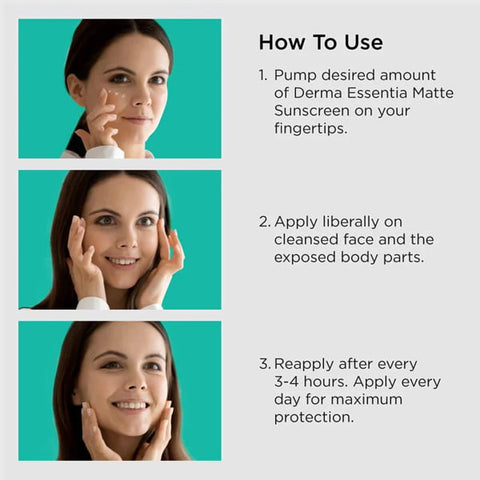
11 Sunscreen Mistakes You Don’t Realize You’re Making
Time to spill the sunny secrets! In your quest for healthy and radiant skin, sunscreen emerges as the unsung hero, shielding you from the sun's relentless ultraviolet (UV) rays. While you acknowledge the importance of this sun shield, here's the catch – just applying it on won't cut it.
Unknowingly, many of us make common sunscreen mistakes that compromise its effectiveness.
Let's explore these pitfalls and learn how to elevate your sunblock game for skin that glows with health and beauty.
Highlights
Before beginning, make sure to watch the video for better understanding
Mistakes to Avoid While Using Sunscreen
Explore some sunscreen slip-ups we make and dive into solutions for a sun-safe and captivating skincare routine!
1.You Put on Sunscreen at the Eleventh Hour
Don't rush your sunscreen application! For the best protection, experts recommend applying it 20 minutes before going in the sun. Slathering it last minute means your skin may miss out on crucial coverage during the initial minutes in the sun.
2.You Apply an Inadequate Quantity
Another common blunder is not applying enough sunscreen. Some may be unsure of the right amount, while others try to save it. For optimal protection, apply two fingers full of sunscreen or about a teaspoon to your neck and face.
3.You Do Not Re-apply
Don't fall for the "apply once and done" myth with sunscreen. Although sunblocks have improved, they aren't designed to endure water or sweat for hours. After the initial application, it breaks down under sun exposure, so re-apply every two to three hours or every 40-60 minutes if you're in water or sweating heavily.
Pro-tip: When on the go, a sunscreen stick becomes the convenient and mess-free solution for effortless sun protection, ensuring you can easily re-apply throughout the day.
4.You Neglect to Apply on Smaller Areas
While you lavish attention on your cheeks, forehead, forearms, and legs, the smaller, less visible spots like the neck and the area behind the ears often get overlooked. It's time to show these neglected areas some love and attention for complete sun protection!
5.You Think Most Sunscreens are the Same
Chemical sunblocks absorb UV light, while physical ones like zinc oxide reflect it away. Physical sunscreens are gentler for sensitive skin as they stay on the surface. Choose the best sunscreen wisely for sun-smart skin!
Pro-tip: To address winter flakiness, opt sunscreen for dry skin. Achieve better results in managing dry and flaky skin during the winter months with the right sunscreen choice.

6.You Presume that Using a Higher SPF Implies an Extended Duration of Sun Exposure
Slathering on SPF 75 or 80 means endless sun time? Think again! High SPF doesn't grant an all-day pass in the sun. The appropriate SPF level varies based on an individual's specific skincare requirements. Opting for a mineral sunscreen will ensure your protection on a day filled with sunshine!
7.You Apply Sunscreen on Damp Skin
Boost your skincare game: Hyaluronic acid loves damp skin, but sunscreen? Not so much. Applying it on wet skin dilutes its power. Get the most out of your routine—give toner, serum, moisturizer, etc., a head start 3-4 minutes before your sunscreen steals the spotlight!
Pro-tip: Experience the perfect blend of protection and comfort with a gel-based sunscreen, offering effective defense against UV rays while providing a light and refreshing feel for your skin.
8.You Use Expired Sunscreen
Before you dive into sun protection mode, give that sunblock a quick date check! Expired sunscreen is like a superhero without its cape – not quite up to the task. If the expiration date is missing on bottle, scribble down the purchase date on the side. Your skin deserves the A-team in defense!
9.You Apply Less Because Your Skin is Dark
Think your darker skin is an invincible shield against sunburn and skin cancer? It's time to bust that myth! While darker skin offers some protection, relying solely on it is like playing with fire. Don't risk it. Use a non-greasy matte finish sunscreen for radiant skin, no matter your shade!

10. You Think Expensive Sunscreens are More Effective
The notion that pricey sunscreens are always superior is a common belief. Nevertheless, numerous cost-effective alternatives are available that can be equally efficient. Take a skin quiz to find the right one for you – because great skin protection doesn't always come with a hefty price tag!
Pro-tip: For acne-prone skin, while searching for skincare products, it is essential to prioritize the best sunscreen for oily skin to ensure effective sun protection without exacerbating excess oil production.

11.Using Sunscreen is Not Exclusive to Sunny Days
Don't be deceived by overcast skies! Even on cloudy days, the sun's rays can harm your skin, with up to 90% of sunbeam sneaking through the clouds. Before heading outside, ensure to apply sunscreen cream to shield your skin from these harmful rays, maintaining a healthy complexion. It is your sidekick, rain or shine!
Take Away!
Choosing the best sunscreen for the face and body is imperative for a comprehensive skincare routine, ensuring optimal protection against harmful UV rays and promoting overall skin health. Avoid the common mistakes while using the sunblock and stay safe!
P.S. Don't let sunscreen mishaps cast a shadow on your skin protection game—stay informed, stay radiant!
FAQs
Q 1. How to apply sunscreen on face?
Ans. Achieve sun-kissed skin protection with photostable sunscreen. Generously apply and spread it evenly on your face. Make sure to cover sun-prone spots like your nose, ears, and neck. Keep the glow going by reapplying every two hours or sooner if you're breaking a sweat or taking a dip!
Q 2. Which SPF sunscreen is best?
Ans. When choosing the perfect SPF sunscreen for yourself, take into account your skin type, daily routines, and exposure to the sun. Dermatologists typically recommend selecting an everyday broad spectrum sunscreen with a minimum SPF of 30, providing reliable defense against both UVA and UVB rays. Choose the best sunscreen cream for sun protection.
Q 3. Does sunscreen prevent tanning?
Ans. Sunscreen shields your skin from sunburn and potential long-term harm. Although it doesn't completely eliminate tanning, which is the skin's natural reaction to UV exposure, sunscreen can lower the risk and minimize the intensity of the tan, keeping your skin safe.
Q 4. Is sunscreen good for skin?
Ans. Absolutely! Sunscreen lotion is essential for your skin! Regular use keeps your skin healthy, maintains its vitality, and contributes to a more youthful appearance by minimizing the impact of sunbeam. Make it a crucial part of your skincare routine!
Q 5. When to apply sunscreen before or after moisturizer?
Ans. Typically, it is suggested that sunscreen should be applied after moisturizer. Start by cleansing your face, applying your usual moisturizer, and allowing it to absorb into your skin. Complete your skincare routine by adding sunscreen as the last step. This sequence helps to maintain hydration while providing the necessary sun protection.
